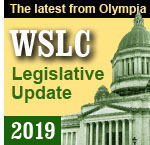STATE GOVERNMENT
Senate amends, OKs nurse break bill; long-term care bill passes
Also approved: Ground-breaking bill to provide long-term care coverage
 This is the latest edition of the weekly Legislative Update newsletter from the Washington State Labor Council, AFL-CIO. If you didn’t receive it via email, subscribe to The Stand and you’ll get the Legislative Updates and all of the WSLC’s other legislative reports.
This is the latest edition of the weekly Legislative Update newsletter from the Washington State Labor Council, AFL-CIO. If you didn’t receive it via email, subscribe to The Stand and you’ll get the Legislative Updates and all of the WSLC’s other legislative reports.
OLYMPIA (April 17, 2019) — The Washington State Senate on Tuesday approved important patient safety legislation designed to ensure nurses and other frontline healthcare workers receive uninterrupted meal and rest breaks, but not before weakening the bill with an amendment to exempt many hospitals in rural parts of the state and to exclude medical technicians.
The labor-opposed amendment to SHB 1155 was sponsored by Rep. Curtis King (R-Yakima) and was adopted on a 26-21 vote as Sens. Annette Cleveland (D-Vancouver), Steve Hobbs (D-Lake Stevens), Mark Mullet (D-Issaquah), Dean Takko (D-Longview), Kevin Van De Wege (D-Sequim) and Lisa Wellman (D-Mercer Is.) joined Republican senators in approving the change. The amended bill later passed the Senate on a 30-18 vote.
The original version of the bill, sponsored by Rep. Marcus Riccelli (D-Spokane), passed the House on a 63-34 vote on March 6. The bill must now return to the House for concurrence or rejection of the changes.
Long-Term Care Trust Act passes Senate
 Also on Tuesday, the Senate approved the Long-Term Care Trust Act, first-in-the-nation legislation to reduce the biggest uninsured risk Washingtonians now face. It passed the Senate 26-22 and must return to the House, where it passed 63-33, for concurrence with changes made in the Senate.
Also on Tuesday, the Senate approved the Long-Term Care Trust Act, first-in-the-nation legislation to reduce the biggest uninsured risk Washingtonians now face. It passed the Senate 26-22 and must return to the House, where it passed 63-33, for concurrence with changes made in the Senate.
Under 2SHB 1087, sponsored by Rep. Laurie Jinkins (D-Tacoma), workers would begin paying a premium of 58 cents per $100 of income in 2022, and vest after five years. Long-term care benefits would first be payable in 2025. The total benefit available would be nearly $37,000, which could be used toward a comprehensive array of long-term care services and supports. This includes in-home care, assisted living, a skilled nursing facility, or even paying a family member to help care for them. The benefit could also be used to pay for meal delivery or construction of a wheelchair ramp.
This ground-breaking legislation will help protect future taxpayers from the cost of long-term care, both to their families and to the state budget. Most of all, it would give families the security of knowing they will get the care they need when they need it most without the added stress of how to pay for it.
Also approved this week
Here are some other labor-supported bills that have been acted upon this week (since Monday’s WSLC Legislative Update):
ASSAULT OF UTILITY WORKER — HB 1380, sponsored by Rep. Mike Pellicciotti (D-Federal Way), would add the assault of a utility worker performing official duties to the list of aggravating factors supporting a sentence above the standard sentencing range. This is a priority bill for IBEW Local 77. — Passed House, 95-0. Passed Senate, 47-1. Heads to governor’s desk.
PLAN 2 DEFAULT — SB 5360, sponsored by Sen. Steve Conway (D-Tacoma), would change the default retirement plan for public workers from Plan 3 to Plan 2, if they fail to choose a plan within 90 days, to ensure more retirees are protected by defined-benefit pensions. — Passed Senate, 39-9. Passed House, 73-22. Must return to Senate for concurrence.
These bills face cutoff deadline TODAY
The deadline for policy bills — those not related to the budget — to pass the opposite house is at 5 p.m. TODAY (Wednesday, April 17). Here are some other labor-supported bills in danger of dying unless they get that vote:
HEALTH CARE: PATHWAY TO UNIVERSAL COVERAGE — 2SSB 5822, sponsored by Sen. Emily Randall (D-Bremerton), would set up a work group to make recommendations for publicly funded, privately delivered health care for all Washington state residents. The group will have representatives from various stakeholders in the state’s healthcare system, including from labor with knowledge of Taft-Hartley trusts, and would report its finding and make recommendations to legislators by Nov. 15, 2020. — Passed Senate, 28-21. Passed House Health Care & Wellness Committee and Appropriations. Now in Rules.
HEALTHY ENVIRONMENT FOR ALL (HEAL) ACT — 2SSB 5489, sponsored by Sen. Rebecca Saldaña (D-Seattle), creating a definition of environmental justice, directing agencies to address environmental health disparities, and creating a task force to recommend strategies for state agencies to incorporate environmental justice principles into their responsibilities. Read more about it. — Passed Senate, 27-21. Passed House State Government & Tribal Relations and Appropriations. Rules Committee relieved of further consideration and it’s ready for a floor vote.
NOTE — In an effort supported by business lobbying groups opposed to this bill, Republican state representatives have introduced 31 amendments (and counting). The clear goal is to run out the clock and try to kill the bill in its entirety.
 REGULATE NON-COMPETITION CONTRACTS — ESSB 5478 and ESHB 1450, sponsored by Sen. Marko Liias (D-Lynnwood) and Rep. Derek Stanford (D-Bothell), would regulate non-competition agreements in Washington state to ensure they aren’t being used to exploit workers and deny them the opportunities to find better jobs. Read more about it. — Both bills were amended. ESSB 5478 passed Senate, 30-18; passed House Labor & Workplace Standards; was pulled from Rules, and is ready for a floor vote. ESHB 1450 passed House, 55-41; passed Senate Labor & Commerce; now in Rules.
REGULATE NON-COMPETITION CONTRACTS — ESSB 5478 and ESHB 1450, sponsored by Sen. Marko Liias (D-Lynnwood) and Rep. Derek Stanford (D-Bothell), would regulate non-competition agreements in Washington state to ensure they aren’t being used to exploit workers and deny them the opportunities to find better jobs. Read more about it. — Both bills were amended. ESSB 5478 passed Senate, 30-18; passed House Labor & Workplace Standards; was pulled from Rules, and is ready for a floor vote. ESHB 1450 passed House, 55-41; passed Senate Labor & Commerce; now in Rules.
 The WSLC Legislative Update is a weekly newsletter of the Washington State Labor Council, AFL-CIO. It describes legislation of particular concern to Washington’s working families during throughout the state legislative session. Links to previous editions are available here. Additional legislative news is posted at The Stand’s State Government section.
The WSLC Legislative Update is a weekly newsletter of the Washington State Labor Council, AFL-CIO. It describes legislation of particular concern to Washington’s working families during throughout the state legislative session. Links to previous editions are available here. Additional legislative news is posted at The Stand’s State Government section.





